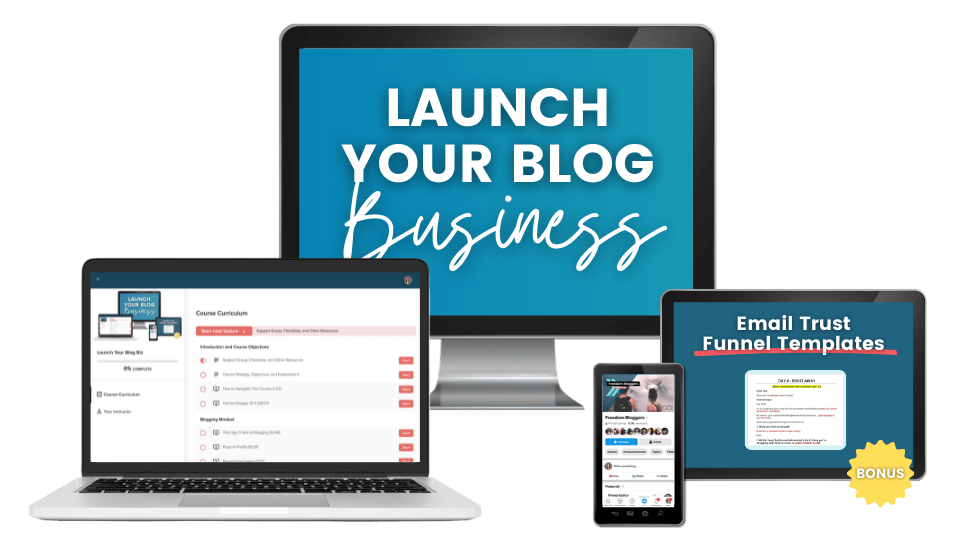I partner with some companies I love! Some of the links on this page may be affiliate links, which means if you make a purchase through one of the links, I may earn a small commission at no additional cost to you.
Are you dreaming of quitting your day job and striking out on your own?
Or have you already taken steps to start an online business, but are now feeling lost at sea?
Either way, this post is for you, my entrepreneurial friend!
If you’ve been trying to figure out how to start an online business and become your own boss, you may have already done some research. But you want to learn more!
In this post, I’ve assembled a complete, 16-point checklist to guide you through your business journey, from conceiving it—to planning it—to building it—to running it.
Bonus: Download a FREE Quick-Start Workbook for helpful prompts, guidance, and checklists to help you get started today!
Table of Contents
How to Become Your Own Boss, Phase 1: CONCEIVE IT
#1 Set Your Goals
First things first: Set some big goals.
Like BIG big.
You want to make a significant change in your career and your life, right? Right!
So aim high, and kick your limiting thoughts to the curb.
Most likely, you want to start your own online business and be your own boss so that you can make more money, in less time, with less stress—and then live a happier, more fulfilled and balanced life.
That’s an amazing dream. But it’s vague.
Before you embark on your entrepreneurial journey, it’s important to get clear on your goals, especially those related to income and time freedom.
How much money do you want to make? Within what timeframe? How many hours do you want to work each week? Do you want to take summers off to travel?
Be specific. Write it down. Plant the seeds for your success!
And don’t edit or second-guess yourself. Your goals can (and I’m quite certain, WILL) evolve over time.
This is your launching point. Why not aim for stars?!
#2 State Your Why
Once you’ve written down your big business goals, you need to get very clear on your WHY.
Think about what you want your life to look like—and how starting an online business and achieving your big goals will allow you to realize that vision.
For example, if your first big goal is to earn $15,000 minimum every month, working only 20 hours per week, think about WHY you want those things.
This is empowering. Because you get to see the potential for taking control, being your own boss, and creating your own best life.
Do you want time freedom so you can spend more time with your kids while they’re still little?
Or to spend more time volunteering for causes you believe in?
Want to create steady, passive income—and semi-retire?
Do you want the money and flexibility to travel whenever the mood strikes you—to your vacation home on the cliffs of Cinque Terre, Italy?

Building a successful and sustainable online business isn’t always easy. There will be ups and downs and tough problems to solve along the way.
When you come up against obstacles in your entrepreneurial journey, knowing your WHY is the thing that will keep you motivated and determined to make it work.
#3 Reset Your Mind
For many people, achieving entrepreneurial success starts with an identity shift.
To BE a successful entrepreneur, you need to SEE yourself as an entrepreneur.
You need to be ready and willing to solve problems and overcome obstacles.
Absolutely no “manifesting” things to happen. As an entrepreneur, you need to take action to MAKE things happen.
You need to be able to train your brain to think critically, solve problems, take smart risks, and be confident in your decisions—and in yourself.
Resetting your mind is often an essential step for resetting your life.
How to Become Your Own Boss, Phase 2: PLAN IT
#4 Determine Your Business Idea
You’ve now set some big, juicy goals—and you know why you want to achieve them.
Next, it’s time to figure out WHAT the heck you’re actually going to do.
If you already have a business idea in mind, you’re one of the lucky ones (go ahead and skip this step, Superstar).
But if you’re like I was with EVERY business I’ve started, you may know you want to make some changes in your career and your life.
And you’d like to start an online business so you can be your own boss and create the financial freedom and time freedom you crave.
But you might not yet have any idea what your new business will be.
To come up with a profitable business idea that will suit you, start by thinking about:
– what you have experience or training in
– what you’re good at
– what you enjoy doing
– what you love learning about
Make a list in all those categories, then do some research to see what other types of online businesses exist that might overlap with some of the things on your list.
Then make a decision.
This part can feel like a struggle. You may be tempted to go down a rabbit hole, trying to land on THE perfect online business idea that will earn you millions.
Don’t let yourself get struck by analysis paralysis!
What’s most important at this stage is to spend a few days (or maybe even a few weeks if that feels better to you) brainstorming. Then make your decision and keep >> moving >> forward.

As you move through the next steps in this checklist, new ideas and inspiration will continue to emerge.
To get your creative juices flowing, here are 59 online business ideas.
#5 Niche Down
Once you’ve settled on your broad business idea, it’s time to “niche down”, which is just business speak for getting more specific about WHO you will serve and how you will do so.
For example, if your big business idea is to start a blog about parenting, you will need to decide precisely WHO you will serve. Parents of newborns? Stay-at-home dads? Parents of kids with ADHD? And then, based on your audience, do some research to figure out how you can help — and how you will make money by helping! Because in order for your online business to be profitable, you need to get paid.
#6 Decide on Your Money-Making Model
Next, it’s time to decide how you will earn money with your online business.
Will you sell physical products that you ship out in the mail?
Or sell digital products that you deliver online or via download (like ebooks and online courses)?
Will you provide professional services remotely (e.g. copywriting services; graphic design services; legal services; coaching).
Have you thought about selling ad space?
Or doing affiliate marketing (i.e. promoting other companies’ stuff and getting a percentage of any sales that come through you)?
Depending on the business and niche you choose, the answer here may be a no-brainer. But still, it’s worth putting some thought into. Since, you know . . .
. . . actually making money is an important part of the whole “how to be your own boss and start your own business” thing.
How to Become Your Own Boss, Phase 3: BUILD IT
#7 Build Your Website
Regardless of whether you’re selling physical products or digital courses, providing professional services remotely, earning income from affiliate marketing, or anything else – it’s important to have an online presence. Because that’s what it means to have an online business.
And the “storefront” for your online business will be your website.
The simplicity or complexity of your website will depend on your business model.
For example, you may only need a static one-page website (like I have for my copywriting business).
On the other end of the spectrum, you might need a complex, multi-page, e-commerce website with shopping cart capabilities and other stuff (I honestly don’t know much about e-commerce at all).
Or you may need something in between, like this blog website you’re on right now.
There are plenty of resources available to help you get your website up and running. I used Weebly to build my simple one-pager freelance copywriting website, which was super easy to create.
But to build this website, I took a Launch Your Blog Business course from the team at Create and Go. The course helped save me a TON of time and frustration. Lauren, who teaches the majority of the lessons, is incredibly thorough and offers step-by-step guidance that was well worth the price of the course. If you’re planning to launch a blog business, I highly recommend this course.
If you do some research, you’ll find lots of resources and options to help you build your own website.
Another option is to hire someone to build your site for you. But that can get expensive—and it also means you’ll have less control over your website. And it will be more difficult (and/or more expensive) if you want to make any changes to it in the future.
#8 Do the Legal Stuff
I’M NOT A LEGAL EXPERT.
That said, here are some things you should know when starting your business.
Website legal pages: When you’re building your website, you’re going to want to include three critical legal pages to your website, including a Privacy Policy, Disclaimer, and Terms & Conditions.
TIP: Check out Amira’s legal template bundles – that’s what I used to create the legal pages on this website. Amira is a lawyer, and she created a broad series of legal templates that you can customize to your needs just by answering a few quick questions. Done and dusted!
Sole proprietor? Corporation? LLC? Partnership?
When you start your own business, you need to decide on your legal business structure.
If you’re not planning on having any employees, and you’ll be a one-person-show, choosing a “sole proprietor” structure will be by far the easiest choice when you’re starting out.
Because there’s not much you’ll need to do. As a sole proprietor:
- You file your business taxes on your 1040 personal tax form, with the inclusion of a Schedule C to report your business profit or loss.
- By default, your “business name” will just be your name.
- If you do want to use a different name for your business, you’ll need to file a DBA (an acronym for “doing business as”). It doesn’t cost much at all and is a simple process.
- If you want to open a business checking account (which I recommend), you’ll need to apply for an EIN, which is like a Social Security number for your business. But again, it’s a simple process.
Your other options, if being a sole proprietor doesn’t suit your needs, include creating an LLC or S-Corp. Or, if you’re starting up with a partner, a Partnership.
One reason some small businesses decide against a sole proprietor structure is that because the business is really just you, and not a separate business entity, you will be personally liable for any claims made against your business. So you’ll need to weigh the risks/benefits for your specific situation (sometimes you can get liability insurance for a minimal cost).
I’m not going to even try to provide insight or advice on those options. Best to talk to a lawyer.
You may (or may not) need permits and/or licenses for your online business.
Depending on where you live and what business you’re in, you may need City or State licenses, permits, and such.
I’d suggest checking the government websites (“.gov” in the URL) for your city and state. And if you still have questions, contact them directly (there should be contact info on the website). Or get advice from a business lawyer.
#9 Set Up Your Invoicing and Payment System
Use business software for billing (and/or creating professional looking invoices) and for taking payments. You want to make it easy-peasy for customers to pay you!
Many software services offer a free version of their product, which will often be enough for your needs when you’re just starting out. I used FreshBooks free version for many years before I finally upgraded to the paid version – I love it.
How to Become Your Own Boss, Phase 4: RUN IT
#10 Generate Business
To make money with your online business, you need customers.
Which means you’ll need to figure out a marketing plan.
Some common tactics for marketing your business and attracting customers include:
- Social media marketing
- Networking
- Email marketing
- SEO
- Ads
- Referrals
- Direct outreach
The way you choose to market your online business will depend on your niche, who you’re targeting, and what you’re selling.
#11 Set Yourself Up for Work-from-Home Success

Work smarter, not harder!
Here are my four top tips for staying productive (and avoiding burnout) when working from home:
- Every night before a work day, write down your schedule for the next day—including what time you’ll start and END your work day. Stick to it. Otherwise, you may get nothing done. Or you may end up working around the clock.
- Take breaks throughout the day to walk, stretch, and just to let your mind be free.
- Use productivity tools and software that will help you run your business more efficiently. There are so many to choose from, I’ll write a post on this separately.
- Create boundaries with family and friends (when you’re at work, you’re at work—just as if you were in an office working for someone else).
#12 Rock Your Business Like the Pro You Are
You are running a business, and you need to treat it that way if you want to build a profitable and sustainable online business.
Please don’t refer to it as your “side hustle.”
Even if you’re still working at another job to keep a roof over your head, referring to your business as a little thing you’re doing on the side creates a dangerous, slippery slope of self-fulfilling prophesy-ness.
Calling it a side hustle might make you feel like if you fail, it’s not a big deal. That it was just a little hobby you were trying out to see if it might fly. And while that may offer some emotional comfort, it’s a dangerous way to think.
Because if you think of your business that way, you’re bound to treat it that way.
If you treat your business like a business, on the other hand, your target customers (not to mention your friends and family who you may feel are judging you) will see it that way too.
Here are some examples of how to run your business like a pro:
- First and foremost, provide exceptional service to your customers. You want to make it easy and enjoyable for them to do business with you. For example:
- Offer top quality products/services
- Respond to inquiries quickly
- Set up autoresponders in your email if you’ll be away for a few days
- In short, treat customers the way you’d want to be treated if the roles were reversed
- Price your products/services appropriately. And by that, I don’t mean offer bargain basement pricing. Quite the opposite! It’s important to understand your value—and claim it.
- Set monthly income goals, and then create a strategic plan for how you’ll achieve them.
- Open a business checking account. As soon as you start making money with your online business, keep your business and personal finances separate. I waited a long time to do this with my copywriting business, and I regret not doing it right from the start.
- Pay yourself. Set your salary, and pay yourself from your business account to your personal account (every two-weeks or monthly, whatever works for you).
- In the beginning, your salary will likely be quite small, but get in the habit of doing this right from the start. Then give yourself incremental raises as you’re able.
#13 Pay Your Taxes
As a business owner in the U.S, you will need to pay your “estimated taxes” four times a year, otherwise you may face penalties.
When you work as an employee, your employer deducts taxes from your paycheck automatically. But when you work for yourself, that doesn’t happen.
Unless you pay your quarterly taxes, you will likely be hit with a big, unexpected tax payment in April. (Don’t fret, paying quarterly taxes takes about 2 minutes, there’s no forms or filing involved).
To make sure you have enough money to pay your estimated taxes, it’s a good idea to put about 30% of each month’s earnings into a special savings account you’ll use only for tax purposes.
And be sure to keep a record of ALL your business-related expenses throughout the year so you can write them off on your annual tax return.
#14 Grow and Improve
Focus on continuous improvement.
To run a successful and sustainable business, it’s important to keep learning and improving, and growing. Strive to become the best at what you do.
Stay ahead of the curve and become known as an expert in your niche.
But don’t waste time trying to reinvent the wheel.
Invest in your business when doing so will help you reach your goals faster and/or with better outcomes.
Be smart with your investments, though. Don’t throw money at any shiny thing that catches your eye.
Before you pay for any courses, coaching, or software, for example, do your due diligence to determine if the investment will be worthwhile for you.
– Will it save you valuable time (freeing up more time for you to work on other aspects of your business)?
– Will it help you provide better (aka higher value) products/services for your customers?
– Will it help you reach your income goals faster?
As I noted earlier, before I launched Grab Your Happy, I took an online blog building course.
After researching the course (and consuming/evaluating a lot of the course creators’ free content), I decided to invest in not just the basic blog building course, but a premium package that includes four digital courses. It was not a small investment up front, but without it, I would have had to invest soooo much more time (I’m sure it saved me MONTHS of time) to get it up and running. As I write this post, I’m continuing to work through the remaining courses (like SEO optimization)—which are also providing MASSIVE value.
With my copywriting business, every single time I’ve paid for business coaching or digital courses, the investment has paid itself off in spades.
#15 Be Happy
No one wants to work for a mean, demanding, grumpy boss.
And since you’re your own boss . . . be a good one!

As you figure out how to become your own boss, it’s important to create joy in your life and in your work.
The happier you are as a person, the happier you’ll be in your business.
And vice versa.
I’ll write more posts about how to be happier in every part of your life, but for now, I’ll leave you with this nugget of brilliant simplicity, which I overheard in a theater:
“Personally, I’m happier when I’m happy!”
Okay, I didn’t actually “overhear” that in a theater. It’s a line from a one-woman comedy show I wrote in my 20s with the politically incorrect title, “Dumb Blondes & Other Nightmares.”
But it’s a fact that’s (maybe, maybe not) backed by science.
#16 Persist
When it comes to business success, persistence is queen.
Because if you don’t have the passion and mindset to overcome challenges, you’re bound to fail.
You’ve likely the heard this overly-quoted remark from Steve Jobs. But in case you haven’t (or if you need to hear it again), here it is:
“I’m convinced that about half of what separates the successful entrepreneurs from the nonsuccessful ones is pure perseverance.”
If you followed Step #3 of this checklist, you’ll be in the right mindset to persevere.
You’ll push through challenges. Problem-solve. And maybe even pivot in a new direction when you determine it’s the smart thing to do.
How can I put these tips into action right away?
Download my free workbook to get started today!



